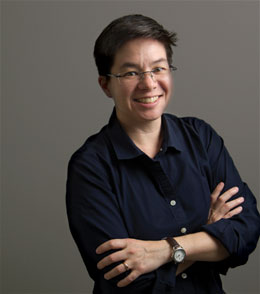:Volume 30 · Number 4 · Summer 2013
The young and the inventive: Catherine Chin
Catherine Chin, associate professor and chair of the Department of Religious Studies
Education: Ph.D., Duke University, 2005; M.A., Duke University, 2000; M.St., Oxford University, 1996; B.A., University of Wisconsin-Madison, 1995
Specialty: Early Christian social and intellectual history
“In religious studies, there’s been this division over the last few decades between people who do social history of religion and people who do theological history of religious ideas,” Catherine Chin said. “I’m interested in seeing how these things work together. How do changing religious mores impact broader cultural and political structures, and vice versa?”
Most recently, her work has involved re-imagining the way in which the Roman world morphed into the Christian world: “I’m interested in the ways in which people in the later Roman Empire think of their own lives as shaped by invisible forces. Souls, things like that. But also language practices — talking, hearing a sermon, singing a hymn.”
Chin has long been fascinated by Ambrose, an influential fourth-century bishop and patron saint of Milan whose writings on the supernatural paved the way for the theory — dominant in Europe for more than a millennia — that kings were divinely appointed, and that bishops and popes were the literal mouthpieces of God.
In recent years, Chin has been studying the scholar Rufinus of Aquileia, who translated early Christian Greek writings into Latin — which in addition to helped to centralize Christianity’s role in the post-Pagan Roman Empire, paved the way for the birth of the liberal arts.
Last year, the UC Davis Humanities Institute awarded Chin a seed grant to study how education networks changed during late antiquity.
“Our whole concept of the liberal arts would be very different without the work of these networks of translators and scholars, monks and bishops,” says Emily Albu, associate professor of classics.
Back to The Young and the Inventive

